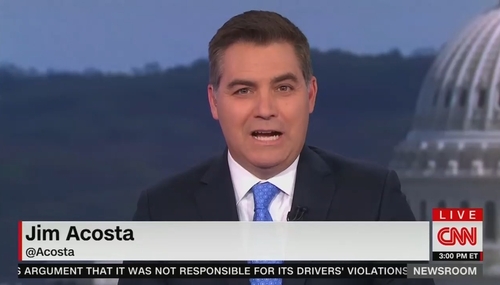President Obama on Friday bypassed Congress to put in place the New York Times' beloved Dream Act by executive order that halted deportation of young people who came to the United States illegally. That merited Saturday's lead story slot, occupied by immigration beat reporter Julia Preston and John Cushman, "Obama To Permit Young Migrants To Remain In U.S."
Preston and Cushman devoted precisely two of their 28 paragraphs to opposing views from "angry" Republicans in Congress. The rest were devoted to Obama's announcement, joyful illegals, and their liberal supporters happy that immigrants could finally, as the Times has reported ad nauseum, "come out of the shadows" (Preston's reporting in particular is notoriously pro-amnesty.) And the paper's succeeding stories on the issue were little better.
From Saturday's lead:
Hundreds of thousands of illegal immigrants who came to the United States as children will be allowed to remain in the country without fear of deportation and able to work, under an executive action the Obama administration announced on Friday.
Administration officials said the president used existing legal authority to make the broad policy change, which could temporarily benefit more than 800,000 young people. He did not consult with Congress, where Republicans have generally opposed measures to benefit illegal immigrants.
The policy, while not granting any permanent legal status, clears the way for young illegal immigrants to come out of the shadows, work legally and obtain driver’s licenses and many other documents they have lacked.
No mention in the story of how the influx of workers will help American citizens find work.
Under the change, the Department of Homeland Security will no longer initiate the deportation of illegal immigrants who came to the United States before age 16, have lived here for at least five years, and are in school, are high school graduates or are military veterans in good standing. The immigrants must also be under 30 and have clean criminal records.
Young people, who have been highly visible and vocal activists despite their undocumented status, have been calling on Mr. Obama for more than a year to stop deporting them and allow them to work. Many of them were elated and relieved on Friday.
An accompanying story Saturday by Trip Gabriel and Helene Cooper put the heat on Republican Mitt Romney: "Obama’s Announcement Seizes Initiative and Puts Pressure on Romney."
In many ways, President Obama’s unilateral shift in immigration policy was a bluntly political move, a play for a key voting bloc in the states that will decide whether he gets another term. But as political moves go, it held the potential for considerable payoff.
It sent a clear signal to fast-growing Hispanic populations in Florida, Colorado, Nevada, Virginia and other states that he understood their frustration at his lack of progress so far in addressing problems with the immigration system and reducing the number of deportations.
"Problems" that occurred when they or their families came over illegally in the first place.
After two weeks in which his re-election campaign often seemed to be struggling to cope with events and losing the upper hand to Mitt Romney, Mr. Obama, for a day at least, was able to drive the agenda. And the president’s announcement put Mr. Romney, whose party is already split on the issue, in a tough spot, pressuring him to choose between further alienating Latino voters who chafed at the anti-illegal immigration stances he took in the primary season and alienating conservatives who reject policies resembling amnesty.
After Gabriel and Cooper made a vague feint toward employment concerns absent from Saturday's lead story, it was back to how bad the politics were for the Republicans.
[GOP] caution reflected concern within the Republican Party that they are at risk of giving up a chance to win the political allegiance of Hispanics, not just for this election but for years to come. Though the Dream Act was originally co-sponsored by a conservative Republican, Senator Orrin G. Hatch of Utah, in recent years most conservatives have worked to block any changes to immigration policies that would provide a path to citizenship for illegal immigrants, and many conservatives have backed measures to limit the rights of illegal immigrants already in the United States.
Ian Lovett reported from Los Angeles on Sunday: "For Many Immigrants, Policy Offers Joy and Relief." Lovett took the paper's standard immigrant-centric perspective, profiling UCLA graduate Ana Sochitl.
For many immigrants here, especially students like Ms. Sochitl, Mr. Obama’s announcement on Friday of his plan to offer work permits to some illegal immigrants under 30 years old who came to the United States before age 16, unleashed a wave of joy and relief, undercut with wariness about if and how the policy might be implemented. The policy does not grant any permanent legal status.
At the taco shop where Ms. Sochitl works in Boyle Heights, a center of Latino culture in Los Angeles and a home to immigrants from all over the world, everyone knew someone who stood to benefit from the new policy.
Even patrons who were already citizens, like María Cano, who came here from Mexico in 1979, reacted with emotion as they named cousins or neighbors who might now be able to stay in the country legally.
“Immigrants have helped build this society for many, many years, and I think it’s time that we were recognized and given a chance,” Ms. Cano, 46, said, tearing up as she spoke. “I know so many people whose parents brought them here illegally, who went to school and started working here. And now there is finally hope for them.”
Lovett didn't bother to cite a single dissenting voice, with the debate cleaved between Latinos satisfied with Obama and those who didn't think he was going far enough.




